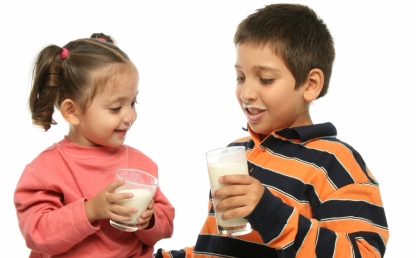
Date : 2 Feb 2017
We will look individually at some of the possible health benefits of milk consumption.
Milk and bone healthChild enjoying milk
Cow's milk can be a source of calcium, a mineral that is important in the development and maintenance of healthy bones and teeth.
Everyone has heard that milk is good for the bones. That is because cow's milk offers a rich source of calcium, a mineral essential for healthy bones and teeth. Cow's milk is also often fortified with vitamin D, which is also beneficial for bone health. However, other nutrients are also necessary for bone health, such as vitamin K, strontium, magnesium and
vitamin C.
Adequate calcium and vitamin D alone are not enough to prevent osteoporosis. Regular physical activity and strength training, along with not smoking and eating a diet low in sodium and high in potassium also contribute to overall bone health and a decreased risk of osteoporosis.
There is also some evidence that the acidifying effect of animal proteins in the diet (such as from cow's milk) could have a negative effect on bone health by causing the body to pull calcium from the bones to restore optimal blood pH.10 As such, the net benefit of calcium in cow's milk may be much lower than generally claimed.
Milk and heart health
Cow's milk is a source of potassium, an increased of which has been associated with vasodilation and reduced blood pressure.
An increase in potassium intake along with a decrease in sodium intake is the most important dietary change that a person can make to reduce their risk of cardiovascular disease, according to Mark Houston, M.D., M.S., an associate clinical professor of medicine at Vanderbilt Medical School and director of the Hypertension Institute at St. Thomas Hospital in Tennessee.3
In one study, those who consumed 4069 mg of potassium per day had a 49% lower risk of death from ischemic heart disease compared with those who consumed less potassium (about 1000 mg per day).3
Unfortunately, according to the National Health and Nutrition Examination Survey, fewer than 2% of US adults meet the daily 4700 mg recommendation.3
Potassium-rich foods include cow's milk, oranges, tomatoes, lima beans, spinach, bananas, prunes and yogurt. A dramatic increase in potassium intake can have risks however (including heart problems), so be sure to consult a physician before making major dietary changes or taking potassium supplements.
It should also be noted that cow's milk contains a high amount of saturated fat and cholesterol, which have been linked to an increased risk of heart disease.
Milk and cancer
The risk of dying from colorectal cancer is highest in geographic locations that receive the least amount of sunlight. Some research suggests that one reason for this is that vitamin D might play a role in cell growth regulation and cancer protection.
According to the National Cancer Institute, "research results overall support a relationship between higher intakes of calcium and reduced risks of colorectal cancer, but the results of studies have not always been consistent."2
Some studies have suggested an increased intake of calcium and lactose from dairy products may help to prevent ovarian cancer.2
Milk and depression
Adequate vitamin D levels support the production of serotonin, a hormone associated with mood, appetite and sleep. Vitamin D deficiency has been associated with depression, chronic fatigue and PMS. Cow's milk and other foods are often fortified with vitamin D.
Milk and muscle building a splash of milk
Cow's milk contains protein, which supports muscle growth and repair.
Cow's milk is designed to help baby cow's grow fast, which is why it makes sense that humans who drink milk intended for baby cows can also bulk up quickly. Cow's milk is a rich source of high-quality protein (containing all of the essential amino acids), and whole milk is also a rich source of energy in the form of saturated fat, which can prevent muscle mass being used for energy.
Maintaining a healthy amount of muscle is important for supporting metabolism and contributing to weight loss and weight maintenance, and sufficient dietary protein is needed to preserve or increase lean muscle mass. Protein found in dairy can support muscle growth and repair. According to Today's Dietitian, a recent analysis of over 20 clinical trials suggested that an increased milk intake can boost muscle mass and strength during resistance exercise in both younger and older adults.6